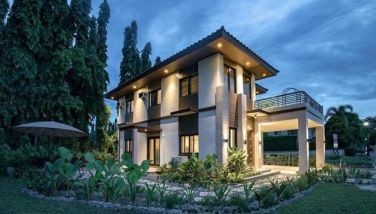Funding sources waiting to be tapped
September 10, 2001 | 12:00am
National President
Chamber of Real Estate and Builders Associations
A number of major sources of housing funds appear to be just waiting to be tapped to get the government’s housing program going for the homeless, particularly the underprivileged and the poor families. This is clearly gleaned from the provisions of existing legislation which have provided these sources of housing funds.
Recently, however, some government housing agencies complained that the delivery of housing units to the beneficiaries is being stalled by lack of funding. So, what has gone wrong with these sources of funds? Agency heads or representatives testified before the House of Representatives committee on housing and urban development chaired by Rep. Prospero C. Nograles. They also reported that the existing Multi-Window Lending System for socialized housing is not working. Banks are supposed to be accredited to serve as conduits of the Pag-IBIG, SSS, GSIS.
For instance, the Comprehensive and Integrated Shelter Financing Act (CISFA) has provided housing funds and pinpointed their non-budgetary sources.
The sources are:
Incremental revenues from the increase in documentary stamp tax for mass socialized housing; 40 percent of the 50 percent national government’s mandatory share from the annual aggregate gross earnings of the Philippine Amusement and Gaming Corporation (PAGCOR); 12 percent of all proceeds of any sale of portions of the Metro Manila military camps to finance mass social housing projects for underprivileged and homeless citizens; all fund sources under the Urban Development and Housing Act not accruing to local government units, such as a minimum of 50 percent from the annual net income of the Public Estates Authority, proceeds from ill-gotten wealth not otherwise previously set aside for any other purposes, and proceeds from the sale or disposition of alienable public lands in urban areas; proceeds from forfeited customs bonds, and a maximum of 50 percent of savings from the budgeted amount for debt servicing.
On top of the above sources of funds for housing, CISFA also provides that the following non-budgetary funding sources shall be availed of:
• Ten percent of the mandatory annual contributions by Philippine Charity Sweepstakes Office to the charity fund shall be channeled to socialized and low-cost housing.
• All unused Agri-Agra allocation funds from banks in the preceding year shall be invested in socialized and low-cost housing.
• The Bangko Sentral ng Pilipinas shall make available its rediscounting facilities to institutions or entities providing financing of socialized and low-cost housing in amounts and rates to be determined by the Monetary Board.
Since CISFA was enacted and took effect in 1995 and up to the year 2002, a funding schedule certified by then Chairman Dionisio C. dela Serna of the Housing and Urban Development Coordinating Council (HUDCC), indicated that some P38.522 billion was expected to be raised from these sources to achieve the objectives of various aspects of the housing program.
These funding sources are in addition to the continuing direct annual national government appropriations of P5 billion, on top of a P5.2 billion for the National Housing Authority resettlement program, P3 billion as subsidy for land acquisition, construction and implementation of the Medium-Rise Public and Private Housing Program, P12 billion for the Community Mortgage Program, P2.542 billion for the cost recoverable program and P3 billion for the local housing program.
An earlier law, the Urban Development and Housing Act, provided the following sources of funds for housing and urban development. These were:
A minimum of 50 percent from the annual net income of the Public Estates Authority for land acquisition for resettlement; proceeds from the disposition of ill-gotten wealth; loans, grants, bequest and donations, whether from local or foreign sources; floatation of bonds, proceeds from social housing tax and subject to the concurrence of local government units, idle lands tax under the Local Government Code; proceeds from the sale or disposition of alienable public lands in urban areas, and domestic and foreign investment or financing through appropriate arrangements. Moreover, local government units were authorized to impose an additional one-half percent tax on the assessed value of all lands in urban areas in excess of P50,000.
The question: Have these sources of funds been properly tapped, released and applied by those concerned to housing?
Chamber of Real Estate and Builders Associations
A number of major sources of housing funds appear to be just waiting to be tapped to get the government’s housing program going for the homeless, particularly the underprivileged and the poor families. This is clearly gleaned from the provisions of existing legislation which have provided these sources of housing funds.
Recently, however, some government housing agencies complained that the delivery of housing units to the beneficiaries is being stalled by lack of funding. So, what has gone wrong with these sources of funds? Agency heads or representatives testified before the House of Representatives committee on housing and urban development chaired by Rep. Prospero C. Nograles. They also reported that the existing Multi-Window Lending System for socialized housing is not working. Banks are supposed to be accredited to serve as conduits of the Pag-IBIG, SSS, GSIS.
For instance, the Comprehensive and Integrated Shelter Financing Act (CISFA) has provided housing funds and pinpointed their non-budgetary sources.
The sources are:
Incremental revenues from the increase in documentary stamp tax for mass socialized housing; 40 percent of the 50 percent national government’s mandatory share from the annual aggregate gross earnings of the Philippine Amusement and Gaming Corporation (PAGCOR); 12 percent of all proceeds of any sale of portions of the Metro Manila military camps to finance mass social housing projects for underprivileged and homeless citizens; all fund sources under the Urban Development and Housing Act not accruing to local government units, such as a minimum of 50 percent from the annual net income of the Public Estates Authority, proceeds from ill-gotten wealth not otherwise previously set aside for any other purposes, and proceeds from the sale or disposition of alienable public lands in urban areas; proceeds from forfeited customs bonds, and a maximum of 50 percent of savings from the budgeted amount for debt servicing.
On top of the above sources of funds for housing, CISFA also provides that the following non-budgetary funding sources shall be availed of:
• Ten percent of the mandatory annual contributions by Philippine Charity Sweepstakes Office to the charity fund shall be channeled to socialized and low-cost housing.
• All unused Agri-Agra allocation funds from banks in the preceding year shall be invested in socialized and low-cost housing.
• The Bangko Sentral ng Pilipinas shall make available its rediscounting facilities to institutions or entities providing financing of socialized and low-cost housing in amounts and rates to be determined by the Monetary Board.
Since CISFA was enacted and took effect in 1995 and up to the year 2002, a funding schedule certified by then Chairman Dionisio C. dela Serna of the Housing and Urban Development Coordinating Council (HUDCC), indicated that some P38.522 billion was expected to be raised from these sources to achieve the objectives of various aspects of the housing program.
These funding sources are in addition to the continuing direct annual national government appropriations of P5 billion, on top of a P5.2 billion for the National Housing Authority resettlement program, P3 billion as subsidy for land acquisition, construction and implementation of the Medium-Rise Public and Private Housing Program, P12 billion for the Community Mortgage Program, P2.542 billion for the cost recoverable program and P3 billion for the local housing program.
An earlier law, the Urban Development and Housing Act, provided the following sources of funds for housing and urban development. These were:
A minimum of 50 percent from the annual net income of the Public Estates Authority for land acquisition for resettlement; proceeds from the disposition of ill-gotten wealth; loans, grants, bequest and donations, whether from local or foreign sources; floatation of bonds, proceeds from social housing tax and subject to the concurrence of local government units, idle lands tax under the Local Government Code; proceeds from the sale or disposition of alienable public lands in urban areas, and domestic and foreign investment or financing through appropriate arrangements. Moreover, local government units were authorized to impose an additional one-half percent tax on the assessed value of all lands in urban areas in excess of P50,000.
The question: Have these sources of funds been properly tapped, released and applied by those concerned to housing?
BrandSpace Articles
<
>
- Latest
Latest
Latest
October 23, 2024 - 9:30am
By May Dedicatoria | October 23, 2024 - 9:30am
October 11, 2024 - 3:45pm
October 11, 2024 - 3:45pm
October 10, 2024 - 11:30am
October 10, 2024 - 11:30am
October 5, 2024 - 12:08pm
October 5, 2024 - 12:08pm
September 24, 2024 - 1:00pm
September 24, 2024 - 1:00pm
September 13, 2024 - 4:00pm
September 13, 2024 - 4:00pm
Recommended

























